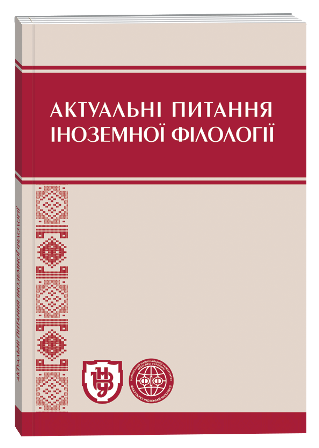PSYCHOTHERAPY DISCOURSE: DEFINITIONS, CONSTITUTIVE FEATURES AND PRINCIPLES OF ANALYSIS
Keywords:
psychotherapeutic discourse, analysis, sign, chronotope, strategy, tacticsAbstract
The article deals with the characteristics of psychotherapy discourse: its definition, constitutive features and principles of analysis. The relevance of the research is determined due to the fact that the theory of discourse is one of the most developed realms of modern anthropocentric linguistics, however, psychotherapy discourse is not sufficiently covered in the scientific literature on linguistics. Attention is drawn to the fact that psychotherapeutic influence is a common type of communicative activity, but its tactical and static potential has not yet been the subject of a special linguistic analysis. As a result of the research, a generalized understanding of psychotherapy as a way of helping healthy people in situations with psychological difficulties is indicated in it. Since the priority in our study is a communicative aspect, it is advisable to rely on the definition of psychotherapy as an activity aimed at the implementation of progressive changes in its interaction with the world through changes in world perception; it also provides the necessary conditions for the development of the individual. Scientific and vocabulary definitions of terms psychotherapy and psychotherapy discourse proceed that psychotherapeutic care is opposed to medical methods of influence. In lexicographic sources, attention is focused on human feelings (depression, anger). As a result of the study, the constitutive features of psychotherapeutic discourse are represented by its content, participants and chronotop. Proceeding from the interpretation of psychotherapy discourse as a collection of linguistic acts, aimed at change and personal growth of a person, a kind of chronotope for psychotherapeutic type of communication is defined. The analysis of psychotherapeutic discourse is based on the principles of subjectivity, dialogueness, ideology, intentionality and contextuality. It is emphasized that these principles of analysis do not depend on a particular psychotherapeutic school, since the elicitation of tactical and strategic potential is defined by the specificity of psychotherapeutic communication, which is determined by the distribution of communicative roles and attitudes of participants in the therapeutic process. The conclusions summarize the analysis of scientific and vocabulary definitions of the terms psychotherapy and psychotherapy discourse, characterize the key constitutive features of psychotherapy discourse. In addition, the main principles of the analysis of psychotherapy discourse are highlighted in the article. Taking into account the results of the research, it was noted that special attention during the linguistic description of the analyzed discourse has to be paid to the participants of the psychotherapeutic session – the therapist and the client, and that serves as the prospect of further research.
References
Булюбаш И. Д. Я тебя слышу. Феномены языка и речи в практике гештальт-терапевта / И. Д. Булюбаш. – Самара : Издат. Дом «БАХРАХ-М», 2014. – 272 с.
Бушев А. Б. Психотерапевтическая риторика : монография / А. Б. Бушев, А. К. Зиньковский, М. Г. Агкацева. – Тверь : ООО «Издательство «Триада», 2013. – 256 с.
Калина Н. Ф. Лингвистическая психотерапия / Н. Ф. Калина. – Киев, 1999. – 426 с.
Карасик В. И. Языковой круг: личность, концепты, дискурс / В. И. Карасик. – М. : Гнозис, 2004. – 309 с.
Касавин И. Т. Текст. Дискурс. Контекст. Введение в социальную эпистемологию языка / И. Т. Касавин. – М. : «Канон+», 2008. – 544 с.
Основи практичної психології / В. Панок, Н. Чепелева, Т. Титаренко. – К. : Либідь, 2001. – 534 с.
Психотерапия детей и подростков / под ред. Х. Ремшмидта ; пер. с нем. – М. : Мир, 2000. – 656 с.
Сумина Н. В. Семантические и прагматические характеристики психотерапевтического дискурса : дис. ... канд. філол. наук : 10.02.19 / Н. В. Сумина. – Нальчик, 2016. – 170 с.
Цапкин В. Н. Единство и многообразие психотерапевтического опыта / В. Н. Цапкин. – М. : МГППУ, 2004. – 199 с.
Collins COBUILD. Advanced Learner’s English Dictionary. – Harper Collins Publishers, 2004. – 1712 p.
Longman Dictionary of English Language and Culture. – Harlow : Longman, 2004. – 1568 p.
Downloads
Published
How to Cite
Issue
Section
License
Copyright (c) 2025 Ольга Качмар

This work is licensed under a Creative Commons Attribution 4.0 International License.







